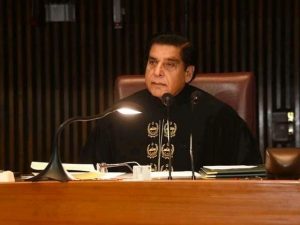NA speaker says opp leader appointment immune to court inquiry
Ashraf maintains that the nomination of Raja Riaz falls beyond of the LHC’s purview.

LAHORE: Raja Pervaiz Ashraf, speaker of the National Assembly, objected to the Lahore High Court’s (LHC) investigation into Raja Riaz’s nomination as opposition leader in the lower house on Tuesday, claiming that the Constitution expressly forbids judicial meddling in parliamentary matters.
Dissenting Raja Riaz Ahmed, the leader of the Pakistan Tehreek-e-Insaf (PTI), assumed the role of opposition leader in the National Assembly (NA) in May of last year after the speaker confirmed the nomination using the authority granted to him under Rule 39 of the NA’s 2007 Rules of Procedure.
Following Imran Khan’s removal from office, PTI leaders offered their collective resignation in protest, which led to the appointment.
Asserting that Raja Riaz’s appointment had been “a blatant violation of Rule 39, 43, and other clauses of the Rules of Procedure and Conduct of Business in the National Assembly, 2007 (the Rules),” Munir Ahmed filed a petition with the LHC through Advocate Azhar Siddique in August.
He had maintained that the ECP had not de-notified the lawmakers of the former ruling party and that none of the recent resignations made in the NA had been accepted.
In December, the high court requested responses on the subject from the parties in question.
Today’s proceedings began with the reading of the NA speaker’s response in court.
The term “proceedings” has always been interpreted and construed strictly, according to Ashraf, who responded that the country’s supreme law “contains a clear constitutional prohibition and the jurisprudence evolved so far on the referred Article unambiguously holds that the courts should not inquire into the proceedings of Majlis-e-Shoora (Parliament)”.
He insisted that the actions taken in connection with the opposition leader’s declaration were parliamentary internal proceedings that were not subject to legal review.
The speaker pleaded with the court that “no illegality was committed during the procedure and no procedural fault whatsoever has been pointed out in the petition” as she raised eight complaints regarding the petition and the court’s processes.
The petition, he continued, “is loaded with assumptions and ideas,” and since the petitioner must be the party who has been wronged, it “is liable to be dismissed.”
The lower house being located in Islamabad, and none of its actions are carried out inside the jurisdiction of the LHC, where the petition is currently being heard, Ashraf continued to raise the issue of territorial jurisdiction.
The federal attorney requested further time to provide a defence before the court.
The hearing was then postponed until February 28 as the court issued orders for the federal government and other parties to respond.









































